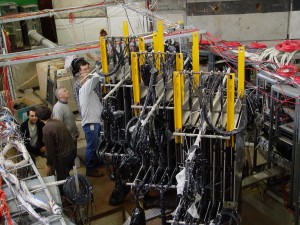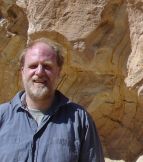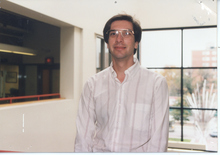Speedy Neutrinos Shine New Light on Einstein’s Theories; What do Harvard Scientists Say
Posted by Noelle Swan Throughout the world, physicists are peeking out from their customary obscurity in a hasty scramble to explain recent challenges to Einstein’s theory of special relativity.
Throughout the world, physicists are peeking out from their customary obscurity in a hasty scramble to explain recent challenges to Einstein’s theory of special relativity.
The scientists are reacting to a second round of experiments at CERN, the European Organization for Nuclear Research, that measured infinitesimal particles called neutrinos traveling at speeds faster than light. Initial findings in September stunned the scientific world and met skepticism, even among the CERN researchers themselves. So they repeated the experiment, shooting neutrinos through nearly 500 miles of rock between Geneva, Switzerland and central Italy, to check the accuracy of their work.
Many physicists have bristled at the claim by members of CERN’s OPERA experiment, which calls into question one of the basic tenets of modern physics. Others have set new eyes on interpretations of relativity, searching for flexibility that could accommodate these speedy particles.
Harvard physicist Gary Feldman says that while the second experiment improved the precision of the measurement, he remains doubtful that the results are accurate. Feldman says that they have addressed just one piece of the possible error. “The difficult part of the experiment is to get all of the time delays that they measure the time with. In other words they have to do a series of corrections for time of flight because they measure through electronics, through cables, and so forth.”
It takes light one nanosecond, or a billionth of a second, to travel one foot. Calculations that incorporate fractions of a blink of an eye over hundreds of miles traveled require extremely precise measurements.

Giles Barr, Oxford University
Oxford professor Giles Barr agrees with Feldman and points out that the CERN scientists are skeptical of their own results. “They are saying, ‘We want some other groups to go out and test this thoroughly.’ ”
Barr works with the only two facilities in the world capable of checking the timing sequence. The Fermi National Accelerator Laboratory (Fermilab) in Chicago can send neutrinos to the MINOS detector 450 miles away in northern Minnesota. Japan’s T2K experiment sends neutrinos from Tokai to Kamioka, Japan, about 175 miles away.
The OPERA, MINOS, and T2K experiments were designed to observe the bizarre tendency of neutrinos to alter their state, not to measure speeds faster than light. Scientists working on these projects have not thoroughly examined their previous data with that possibility in mind.
Boston University physicist Andrew Cohen says that T2K has existing data that could confirm or negate CERN’s results. “They don’t have to record any new neutrino event…. They recorded all the information they need, they just have to do the analysis.”

Alec Habig, University of Minnesota
Physicists at MINOS also are analyzing their previously collected data. Fermilab physicist Alec Habig said that an experiment in 2007 hinted at similar results but the researchers doubted their findings, citing probable equipment shortcomings. The experiment’s intent was to determine the mass of neutrinos. While their speed factored into calculations, researchers designed the experiment under the assumption that they would travel slower than light.
“No one had ever expected that there’d be a need for precision on the fast side,” Habig said. “We just published what we had and went on figuring that eventually we would go back and try to do a better job.”
Likewise, scientists at Fermilab are refining data collected in 2007 and preparing to run their own experiment to test CERN’s claim.
This process takes time. Habig says that Fermilab cannot simply replicate the OPERA experiment right down to the equipment. “You want to go about solving the problem as independently as you can, so that you don’t make the same mistakes,” Habig said. “If we do it independently, when people compare our results to theirs, they’re more likely to believe the combination of the results.”
While Feldman and Barr both believe that OPERA’s readings will be proven wrong, others are willing to entertain the possibility of an exception to Einstein’s theory.

Andrew Cohen, Boston University
At BU, Cohen and Nobel Prize-winning physicist Sheldon Glashow have been contemplating ways to expand the theory of relativity to accommodate faster-than-light neutrinos.
“You can’t just say relativity is wrong and now all of a sudden nothing works anymore,” said Cohen. “You have to extend the theory to accommodate the results without disturbing all the old ones that work.”
Theoretical physicists have attempted to simply stretch the theory of relativity to allow for particles that move a tiny bit faster than light. Cohen and Glashow have published a paper highlighting a contradiction in this accommodation.
According to Cohen and Glashow, if the neutrinos actually travelled faster than the speed of light, they should have lost energy on the way and not reached their final destination. Researchers working on another project known as ICARUS at Gran Sasso National Laboratory, confirmed that the neutrinos observed by OPERA did not lose energy in the way predicted by Cohen and Glashow.
Cohen insists that while his paper refutes theorists’ one attempt to make room for the OPERA results, it does not prove OPERA definitively wrong. “Someone needs to come up with some other way to modify our existing ideas to allow for superluminal [faster-than-light] neutrinos.” He says that while the majority of physicists suspect that cannot be done, “Physicists are creative. If the OPERA experiment is confirmed by MINOS, then we’ll all be trying to do it.”
Related posts:
- European Scientists Claim They Have Broken Einstein’s Theory; Harvard Physicist Says Think Again
- Scientists Seek to Document Later Fall Colors
- Occupy Harvard: Students Set Up Tents in Harvard Yard as Part of Occupy Wall Street Protests
- Study Links Food Container Toxins to Emotional and Behavioral Problems in Young Girls; Researchers from Harvard and BU Weigh-in on the Issue
- Document Sheds Light on Origins of JFK’s ‘Ask Not What Your Country Can Do for You’ Speech
Short URL: http://www.newenglandpost.com/?p=8060









The ICARUS scientists didn’t time the particles. Instead, they looked at the energy signature of the neutrinos. The OPERA recorded speed of Neutrino which is more than light. Before 23 years, I had proved mathematically that relative velocity may be more than light velocity. CERN proved experimentally that velocity of Neutrinos may be more than light, if this news will be confirmed then that will be new beginning of physics. So, it is necessary to think different than old concept of science.
Please read paper “What is matter & dark matter is made up of?” on my web site http://www.maheshkhati.com. This paper may help to find solution to this problem & other problems like what is dark matter? & about true relativity. I also proved E= mc^2 without referring Einstein’s relativity. I strongly oppose special theory of relativity
[...] This article first was published by New England Post on November 29, 2011 under the headline Speedy Neutrinos Shine New Light on Einstein’s Theories; What do Harvard Scientists Say. [...]